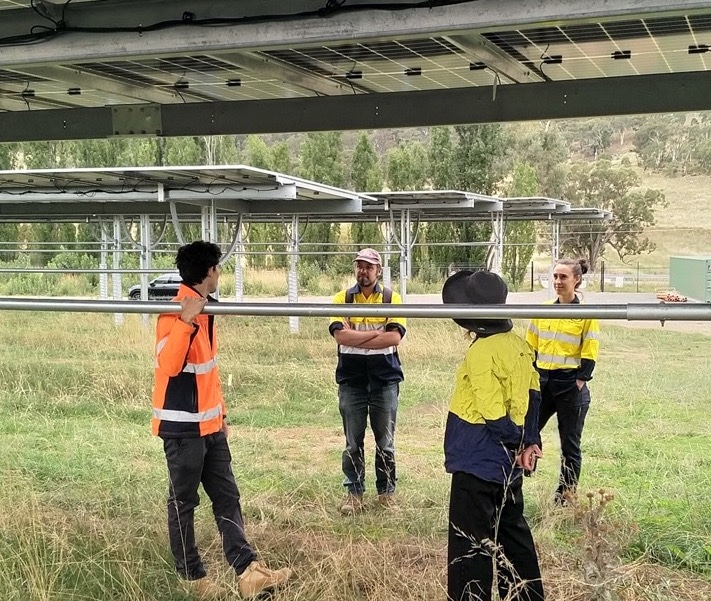Majura Community Solar Farm was eight years in gestation, and on Friday morning it woke up to the sun!
The 1 MW generator is co-owned by some 550 people in the Canberra community, each of whom has invested between $500 and $100,000 to take part in Australia’s energy transition, and make a reasonable return in the process.
“We’re really pleased to have the kind of structure where we can have hundreds of investors, particularly those people who might rent or live in apartments,” Lawrence McIntosh, Principal Executive Officer of SolarShare told pv magazine Australia in 2019.
Profits resulting from Majura’s annual revenue, calculated at more than $360,000, will be proportionally returned to investors.
Nick Fejer, Chair of SolarShare, said members in Majura can expect a 5% return within 12 months, possibly even by the end of the 2020-21 financial year, depending on the weather.
Fejer assured investors on Friday that although Australia is experiencing a La Niña weather phase at the moment, along with its cooler temperatures and fewer sunny days, the economic modelling for the solar fam is conservative and takes such variations into account.
The idea of a community-owned solar farm was originally mooted by the ACT Government, which has since also guaranteed a feed-in tariff for energy generated by the Majura project of 19.56 cents per kilowatt hour for the coming 20 years.
The first sod was turned on the three-hectare site — which is leased from nearby Mount Majura Vineyard — at the end of August last year, after renewable energy developer CWP Renewables provided an $800,000 loan in 2019, to cover the shortfall required for the 2.4 million project to go ahead.
McIntosh told pv magazine Australia today that, “Everyone involved is credibly proud that all those years of work have paid off. It was great to see this fabulous community of people who we’ve had around us — the investors, as well as service providers, the ACT government — getting a chance to see the project come to fruition in a really good way.”
Spreading the solar benefit
Around 30% of Australians are still excluded from the benefits of powering their lives with renewable energy, for reasons such as they rent their home, or they have an unsuitably shaded roof or roof space too small to accommodate viable solar PV generation.
“We’ve now got a model that works,” for including more people in the renewable transition, said ACT Minister for Energy and Emissions Reduction, Shane Rattenbury at the celebration of generation from Majura. He added, “There’s no reason why it can’t be replicated. I’d like to think this is really just the first of this scale.”
Majura Community Solar Farm still holds the title of the largest community solar farm in Australia, although nearby Goulburn Community Energy Cooperative now has plans for a 1.2 MW solar farm on vacant land leased from the Australian Rail Track Corporation on the edge of the regional city.
McIntosh says SolarShare’s next investment is most likely to be in behind-the-meter solar generation, either rooftop or ground mounted, for local industry or commercial ventures.
Epho Commercial Solar, which was recently acquired by AGL, consulted on and built the Majura solar farm, and is contracted to run operations and maintenance on the project for the coming two years, after which the contract will be renegotiated.
In the meantime this community-owned generator will produce enough energy to power 250 homes and abate some 1,600 tonnes of carbon dioxide.
“On Thursday, we felt we were energising not just a solar power plant, but a whole community of people transitioning themselves to a more sustainable future,” says McIntosh.
This content is protected by copyright and may not be reused. If you want to cooperate with us and would like to reuse some of our content, please contact: editors@pv-magazine.com.









2 comments
By submitting this form you agree to pv magazine using your data for the purposes of publishing your comment.
Your personal data will only be disclosed or otherwise transmitted to third parties for the purposes of spam filtering or if this is necessary for technical maintenance of the website. Any other transfer to third parties will not take place unless this is justified on the basis of applicable data protection regulations or if pv magazine is legally obliged to do so.
You may revoke this consent at any time with effect for the future, in which case your personal data will be deleted immediately. Otherwise, your data will be deleted if pv magazine has processed your request or the purpose of data storage is fulfilled.
Further information on data privacy can be found in our Data Protection Policy.